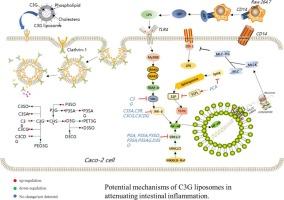Enhanced anti-inflammatory effects and metabolic profiles of cyanidin-3-glucoside via nanoliposomal encapsulation in Caco-2 and RAW 264.7 co-culture system
IF 3.8
2区 农林科学
Q2 FOOD SCIENCE & TECHNOLOGY
引用次数: 0
Abstract
Cyanidin-3-glucoside (C3G) has been found to prevent/treat intestinal disease and maintain gut homeostasis. Numerous studies have proved that nanoliposomes can improve the absorption and utilization of food nutrients. However, the impacts of C3G nanoliposomes (C3G-NL) are still unkown. This study investigated the effects of cyanidin-3-glucoside nanoliposomes (C3G-NL) on intestinal inflammation and permeability using a Caco-2/RAW264.7 co-culture model. ELISA and qPCR results showed that C3G-NL reduced pro-inflammatory markers, including TNF-α, IL-6, IL-8, cyclooxygenase-2, and inducible nitric oxide synthase, while inhibiting the NF-κB/MAPK pathway. C3G-NL also improved intestinal barrier integrity by increasing transepithelial electrical resistance and upregulating tight junction proteins (zonula occludens-1, occludin, claudin-1). Additionally, C3G-NL enhanced C3G metabolism, leading to the formation of intermediary metabolites like chalcone and dihydroflavonols, which contributed to the synthesis of other anthocyanins (delphinidin, peonidin, petunidin, malvidin, and pelargonidin). Overall, C3G-NL helps mitigate inflammation and restore tight junction integrity via metabolic regulation.

在 Caco-2 和 RAW 264.7 共培养系统中通过纳米脂质体封装增强青花素-3-葡萄糖苷的抗炎作用和代谢特征
研究发现,花青素-3-葡萄糖苷(C3G)具有预防/治疗肠道疾病和维持肠道平衡的作用。大量研究证明,纳米脂质体可以促进食物营养素的吸收和利用。然而,C3G 纳米脂质体(C3G-NL)的影响尚不清楚。本研究利用Caco-2/RAW264.7共培养模型研究了青花素-3-葡萄糖苷纳米脂质体(C3G-NL)对肠道炎症和渗透性的影响。ELISA 和 qPCR 结果表明,C3G-NL 可降低促炎标志物,包括 TNF-α、IL-6、IL-8、环氧化酶-2 和诱导型一氧化氮合酶,同时抑制 NF-κB/MAPK 通路。C3G-NL 还能通过增加跨上皮电阻和上调紧密连接蛋白(zonula occludens-1、occludin 和 claudin-1)来改善肠屏障的完整性。此外,C3G-NL 还能促进 C3G 的新陈代谢,形成查尔酮和二氢黄酮醇等中间代谢产物,从而促进其他花青素(delphinidin、peonidin、petunidin、malvidin 和 pelargonidin)的合成。总之,C3G-NL 有助于减轻炎症,并通过新陈代谢调节恢复紧密连接的完整性。
本文章由计算机程序翻译,如有差异,请以英文原文为准。
求助全文
约1分钟内获得全文
求助全文
来源期刊

Journal of Functional Foods
FOOD SCIENCE & TECHNOLOGY-
CiteScore
9.60
自引率
1.80%
发文量
428
审稿时长
76 days
期刊介绍:
Journal of Functional Foods continues with the same aims and scope, editorial team, submission system and rigorous peer review. We give authors the possibility to publish their top-quality papers in a well-established leading journal in the food and nutrition fields. The Journal will keep its rigorous criteria to screen high impact research addressing relevant scientific topics and performed by sound methodologies.
The Journal of Functional Foods aims to bring together the results of fundamental and applied research into healthy foods and biologically active food ingredients.
The Journal is centered in the specific area at the boundaries among food technology, nutrition and health welcoming papers having a good interdisciplinary approach. The Journal will cover the fields of plant bioactives; dietary fibre, probiotics; functional lipids; bioactive peptides; vitamins, minerals and botanicals and other dietary supplements. Nutritional and technological aspects related to the development of functional foods and beverages are of core interest to the journal. Experimental works dealing with food digestion, bioavailability of food bioactives and on the mechanisms by which foods and their components are able to modulate physiological parameters connected with disease prevention are of particular interest as well as those dealing with personalized nutrition and nutritional needs in pathological subjects.
 求助内容:
求助内容: 应助结果提醒方式:
应助结果提醒方式:


